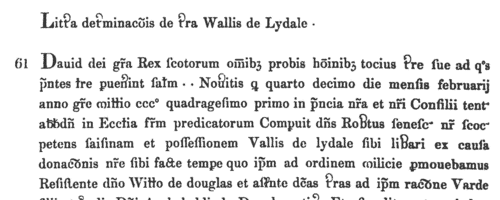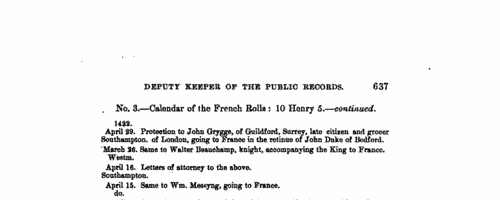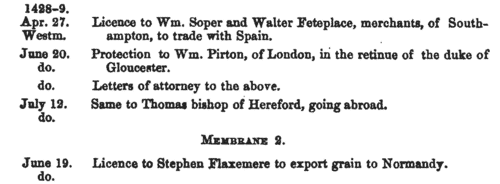Berkeley Surname Ancestry ResultsOur indexes 1000-1999 include entries for the spelling 'berkeley'. In the period you have requested, we have the following 535 records (displaying 31 to 40): Single Surname Subscription | | | Buying all 535 results of this search individually would cost £2,580.00. But you can have free access to all 535 records for a year, to view, to save and print, for £100. Save £2,480.00. More... |
These sample scans are from the original record. You will get scans of the full pages or articles where the surname you searched for has been found. Your web browser may prevent the sample windows from opening; in this case please change your browser settings to allow pop-up windows from this site. Fine Rolls
(1377-1383)
The fine rolls of the 1st to 6th years of the reign of king Richard II record part of the government administration in England, with orders sent out day by day to individual officers, and commitment of particular responsibilities and duties. There is also some material relating to Wales, Scotland, Ireland and the English possessions in France. BERKELEY. Cost: £4.00.  | Sample scan, click to enlarge

| Liegemen and Courtiers (1395)
The surviving earliest records of the Privy Council of England, from the 10th year of the reign of Richard II to the 11th year of Henry IV, mostly found among the Cottonian manuscripts in the British Museum, were transcribed literatim by sir Harris Nicolas and printed in 1834 by command of king William IV. The records mainly refer to the day to day business of the Crown, particularly regarding the administration of the kingdom and relations with France, Scotland, Ireland and Wales. Almost all are in French.
BERKELEY. Cost: £6.00.  | Sample scan, click to enlarge

| Douglas family charters
(1150-1400)
The register of the more ancient writs of the Douglases of Dalkeith, Midlothian, Earls of Morton is probably the oldest chartulary of lay possessions in Scotland, and contains about 300 charters. It was edited by C. Innes and published by the Bannatyne Club in 1853 as part II of the Registrum Honoris de Morton. The names that occur are principally those of grantors, grantees and witnesses, mostly from Midlothian.BERKELEY. Cost: £4.00.  | Sample scan, click to enlarge

| Liegemen and Courtiers (1402)
The surviving earliest records of the Privy Council of England, from the 10th year of the reign of Richard II to the 11th year of Henry IV, mostly found among the Cottonian manuscripts in the British Museum, were transcribed literatim by sir Harris Nicolas and printed in 1834 by command of king William IV. The records mainly refer to the day to day business of the Crown, particularly regarding the administration of the kingdom and relations with France, Scotland, Ireland and Wales. Almost all are in French.
BERKELEY. Cost: £6.00.  | Sample scan, click to enlarge

| Liegemen and Courtiers (1404)
The surviving earliest records of the Privy Council of England, from the 10th year of the reign of Richard II to the 11th year of Henry IV, mostly found among the Cottonian manuscripts in the British Museum, were transcribed literatim by sir Harris Nicolas and printed in 1834 by command of king William IV. The records mainly refer to the day to day business of the Crown, particularly regarding the administration of the kingdom and relations with France, Scotland, Ireland and Wales. Almost all are in French.
BERKELEY. Cost: £6.00.  | Sample scan, click to enlarge

| Grantees of offices, commissions and pardons
(1413-1416)
The Patent Rolls are the Chancery enrolments of royal letters patent. Those for the 1st, 2nd and 3rd years of the reign of king Henry V (21 March 1413 to 20 March 1416) were edited for the Public Record Office by R. C. Fowler, and published in 1910. The main contents are royal commissions and grants; ratifications of ecclesiastical estates; writs of aid to royal servants and purveyors; and pardons. The commissions of the peace issued for the English towns and counties and entered on the rolls, being largely repetitive, have been consolidated in a single appendix.BERKELEY. Cost: £2.00.  | Sample scan, click to enlarge

| The English in France
(1417-1418)
King Henry V of England claimed the throne of France (and quartered the fleurs-de-lis of France with the lions of England on the royal standard) as had his predecessors since Edward III, as descendants of Philip IV of France. He married Katherine, youngest daughter of king Charles VI of France in 1420, and thereafter styled himself 'heir and regent of France'. The English had real power or influence in Brittany, Normandy, Flanders and Gascony, and actual possession of several coastal garrisons, in particular Calais, where the French inhabitants had been replaced by English. The English administration kept a series of records called the French Rolls. On these are recorded royal appointments and commissions in France; letters of protection and safe-conduct to soldiers, merchants, diplomats and pilgrims travelling to France from England and returning, and to foreign legations. There are also licences to merchants to export to the Continent, and to captains to transport pilgrims. This calendar of the French Roll for the 5th year of the reign of Henry V (21 March 1417 to 20 March 1418) was prepared by Alexander Charles Ewald and published in 1883. BERKELEY. Cost: £6.00.  | Sample scan, click to enlarge

| Worcestershire landowners
(1428)
An inquiry was held at Worcester 30 September 1428 into the ownership of the knight's fees from each hundred in the county (but not the city) of Worcester. The jurors based their findings on a previous inquiry a few years earlier, so that for each fee or portion of a fee the name of the previous freeholder is also given. This inquiry was used as the basis for the raising of a subsidy from the laity, taxed at 6s 8d per owner of an entire knight's fee, 1s 8d for a quarter of a knight's fee, smaller fractions being exempt; in addition, the population of each parish was taxed by a formula based on earlier taxations dating back to 1290; but the taxation of the parishes was levied by the parishes themselves, so there is no return of individual householders. The names that appear in these records (the inquiry and the subsequent lay subsidy roll) are thus those of the major freeholders, the jurors, assessors and collectors. The rolls were edited and translated by John Amphlett for the Worcestershire Historical Society and printed in 1902.BERKELEY. Cost: £4.00.  | Sample scan, click to enlarge

| Close Rolls
(1429-1435)
The close rolls of the 8th to 13th years of the reign of king Henry VI record the main artery of government administration in England, the orders sent out day by day to individual officers, especially sheriffs of shires: they are an exceptionally rich source for so early a period. There is also some material relating to Wales, Scotland, Ireland and the English possessions in France. Also included is the Exchange Roll of 1424 to 1434, of licences to transmit sums of money out of the realm.BERKELEY. Cost: £4.00.  | Sample scan, click to enlarge

| The English in France
(1440)
King Henry VI of England (one of the grandsons of Charles VI of France) claimed the throne of France (and quartered the fleurs-de-lis of France with the lions of England on the royal standard) as had his predecessors since Edward III, as descendants of Philip IV of France. The English had real power or influence in Brittany, Normandy, Flanders and Gascony, and actual possession of several coastal garrisons, in particular Calais, where the French inhabitants had been replaced by English. Henry VI came to the throne only seven years after his father had trounced the French at Agincourt; but his cousin, Charles VII, who became king of France in the same year, spent his long reign rebutting the English king's claim to his throne by territorial reconquest and consolidation. The English administration kept a series of records called the French Rolls. On these are recorded royal appointments and commissions in France; letters of protection and safe-conduct to soldiers, merchants, diplomats and pilgrims travelling to France from England and returning, and to foreign legations. There are also licences to merchants to export to the Continent, and to captains to transport pilgrims. As Henry VI's reign progressed, and the English grip on northern France loosened, the French Rolls also increasingly include entries concerning the ransoming of English prisoners.BERKELEY. Cost: £6.00.  | Sample scan, click to enlarge

|
Research your ancestry, family history, genealogy and one-name study by direct access to original records and archives indexed by surname.
|












